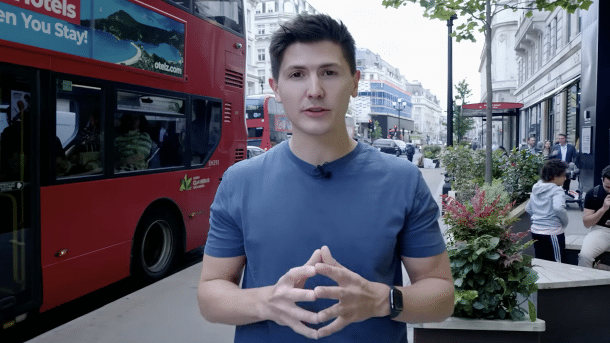Synthesia: Visit to the factory of sneezing avatars
A start-up based in London is trying to break into the market with AI videos. How can it be ensured that this is not misused for deepfakes?

Synthesia avatar with hands, placed in London.
(Image: Synthesia)
The start-up is ideally located in London. You walk down Oxford Street from the brand new Tottenham Court Road Elizabeth Line station, turn down a side street into a pretty square and then reach Kent House, which is otherwise home to a few investment firms and a human resources company. This is where Synthesia has set up shop, a company that, if its managers and backers have their way, is set to roll up the video market.
Germany, Denmark, Great Britain, USA
Instead of human presenters, experts or seminar leaders, avatars that look and speak like real people will be seen on platforms such as YouTube, company websites, the intranet and educational institutions. The aim is not to spoil the business of video professionals, says Alexandru Voica, the corporate affairs manager who welcomes heise online. Instead, the aim is to turn content into entertaining films that would otherwise languish on servers in text form. Voica, who comes from Romania, studied computer science and previously worked at Meta, is not sceptical about artificial intelligence. He is far from over-optimistic. Nevertheless, he can see where the journey is heading.
Videos by heise
In addition to its current British roots, Synthesia also has Danish and German roots. CEO and co-founder Victor Riparbelli comes from Denmark, while his co-founder Matthias Niessner still holds a professorship in visual computing at the Technical University of Munich. Other employees and early colleagues come from the universities of Cambridge, Stanford and University College London. "Our mission is to empower everyone to make video content - without cameras, microphones or a studio," is the company motto. The aim is to "radically change" the content creation process.
36 minutes for free
In practice, this means that Synthesia's avatars can now sneeze (relatively well). The start-up recently launched eleven new "expressive avatars" online. They are populated with text material via a web interface. The business is based on the "avatar as a service" approach: newcomers can generate content for up to 36 minutes a year free of charge, with 120 or 360 minutes available for 20 or 59 euros a month respectively. Anything more than this must be arranged via corporate sales, which includes branding, an unlimited number of minutes and an unlimited number of avatars.
(Image: Synthesia)
What Synthesia offered in the first few years after it was founded in 2017 initially seemed quite rigid. The avatars were always based on real people; the company patented certain processes such as facial feature loops. Gradually – and especially with the introduction of the latest software version, called Synthesia Software 2.0 –, things got better. The avatars look deceptively real – at least if you don't look closely. Up to 95 percent of the time needed for video production can be saved. The idea is that companies can produce their own learning and marketing material without having to hire expensive video studios.